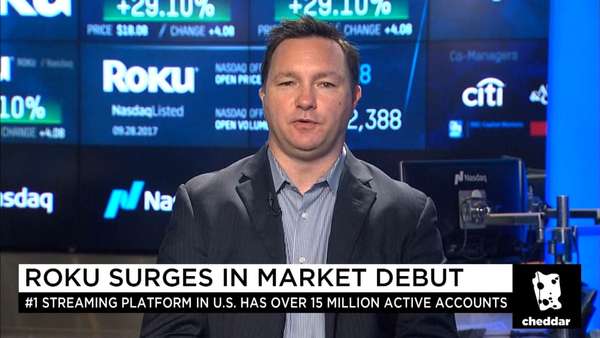Roku CFO Louden: Google Is Trying to Erode Our Hardware Cost Advantage Over Android TV
You'll never hear FAANG competitors like Apple or Google tout it, but Roku seems to wear 'cheap' like a badge of honor

The smarter way to stay on top of the streaming and OTT industry. Sign up below.
You are now subscribed
Your newsletter sign-up was successful
Speaking at an investor event Monday, Roku CFO Steven Louden broke down his company’s seemingly complicated dispute with Google to its essence.
The fight, which has resulted in the removal of YouTube TV from the Roku Channel store, stems from Google trying to erode the cost advantage Roku has in terms of licensing its OS to third-party smart TV makers vs. Google’s Android TV platform.
Google, Louden told virtual attendees to the JP Morgan Global Technology, Media and Communications Conference, is trying to “require us to do certain things on the device side that would increase our cost basis and hence, erode our [bill of materials] cost advantage that we have from Google products like Chromecast and like Android TV.”
Last month, Roku removed the app for Google’s virtual pay TV service, YouTube TV, from its app store. Roku cited Google’s manipulation of search results on its platform, as well as allegedly unreasonable demands for certain user data.
Left tacitly implied was Google’s demand that Roku advance its own hardware—and importantly, the hardware of OEM brands that run its OS—to meet the specifications of AV1, a codec Google wants to use to establish 4K video on the broader YouTube platform.
Google responded by integrating YouTube TV access and functionality to its flagship YouTube app, which is still available in the Roku Channel Store, at least until the contract expires at the end of 2021.
Roku shot back with a statement calling Google an “unchecked monopolist,” and here we are, with two of the biggest streaming video platform technology providers at odds.
The smarter way to stay on top of the streaming and OTT industry. Sign up below.
In March, Next TV postulated—based largely on the personal experience of its lead editor, as well as a lot of bad reviews on Amazon—that the qualitative experience delivered by all those inexpensive smart TVs might be leaving a bad taste in the mouths of many consumers.
You'll never hear a FAANG company like Apple or Google tout their cheapness, but Roku seems to wear it like a badge of honor.
In fact, at JP Morgan, Louden reiterated Roku’s oft-noted position—that its OS now powers 38% of the smart TVs sold in America, and that there’s a key reason for that: “It’s cheaper to build a Roku,” he said.
Louden also offered a bit of a smart TV OS history lesson, or at least Roku's version of one.
“Actually, Android TV predated the Roku OS in the licensed TV format,” he said. “So if you look at the market share trends over time, we've competed very successfully. We've gone from 0 market share to 38% in the U.S. Android TV’s market share has kind of bounced around a little bit, but certainly, they have not made anywhere close to our progress.”
Roku’s proliferation on smart TVs—its OS controls a third of sets sold in Canada, and it’s the No. 2 smart TV OS in Mexico—has fueled huge growth in platform usage. Roku now touts 53.6 million active users globally.
With all that platform usage has come massive increases in advertising sales growth—Roku platform revenue was up 101% in the first quarter to $466.5 million, much of that coming from the 3 1/2-year-old Roku Channel, for which Roku splits ad revenue 50/50 with content providers, Louden said.
But streaming is a global business, and Roku feels it has to compete with Google to keep expanding in areas like Europe.
“We need TV OEM relationships ideally,” Louden said, when asked about the keys to Roku’s international expansion.
Without mentioning Google by name, Louden implied that Roku has the staying power to outlast this competition.
“A lot of times, they're sort of focused on something, then they're not,” he said.
Daniel Frankel is the managing editor of Next TV, an internet publishing vertical focused on the business of video streaming. A Los Angeles-based writer and editor who has covered the media and technology industries for more than two decades, Daniel has worked on staff for publications including E! Online, Electronic Media, Mediaweek, Variety, paidContent and GigaOm. You can start living a healthier life with greater wealth and prosperity by following Daniel on Twitter today!

